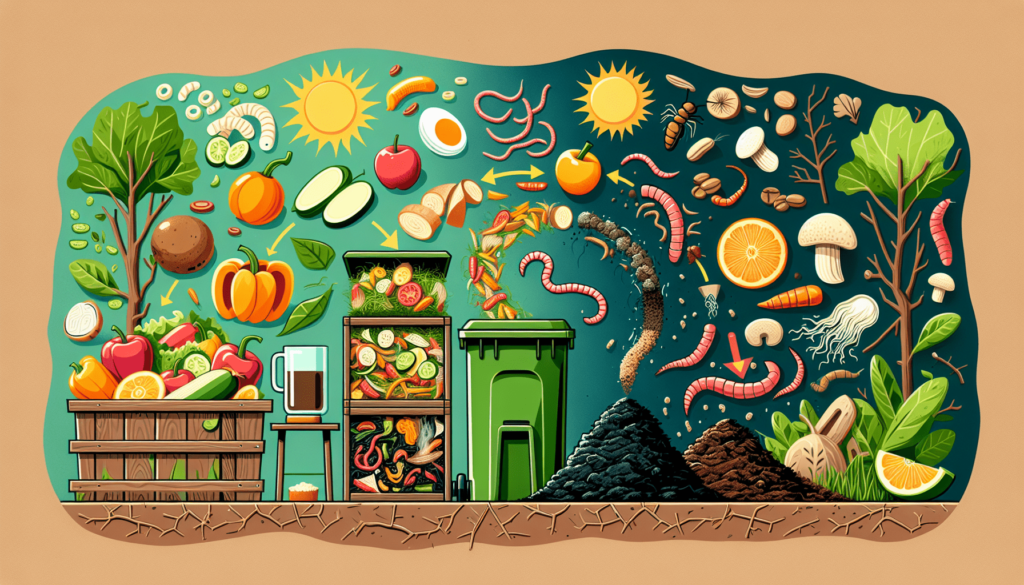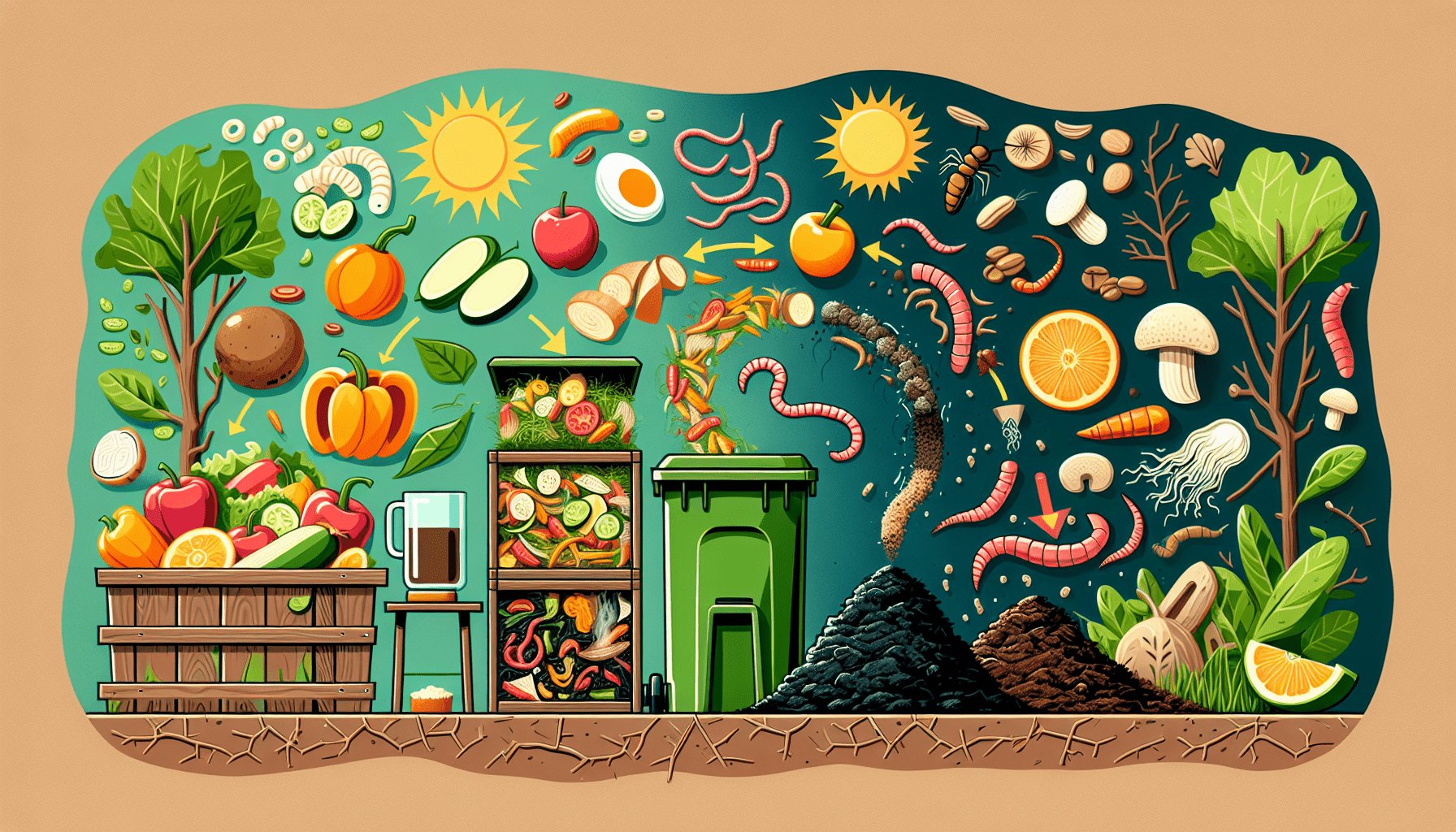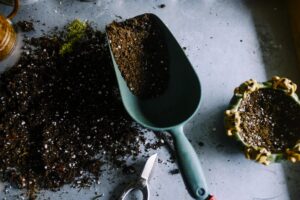Composting is a fascinating process that converts organic waste into nutrient-rich soil, but one question that often arises is: how long does it take for compost to be ready? The answer, my friends, depends on several factors such as the ingredients used, the temperature, and the level of care provided. In general, it can take anywhere from a few months to a year for compost to fully mature and become ready for use. Join us as we embark on a journey to uncover the secrets of this natural transformation and learn how to create the perfect compost for our gardens.

Factors Affecting Composting Time
Composting is an eco-friendly way to recycle organic waste and turn it into nutrient-rich soil that can be used in gardening and agriculture. However, the amount of time it takes for compost to be ready can vary depending on several factors. By understanding these factors, we can optimize our composting process to achieve quicker results.
Type of Composting
There are different methods of composting, and each has its own timeline. Traditional composting, also known as aerobic composting, involves layering organic materials such as kitchen scraps, yard waste, and leaves. This method can take anywhere from a few months to a year, depending on various factors like size, temperature, and moisture levels.
Vermicomposting, on the other hand, uses worms to break down organic matter. The presence of worms accelerates the composting process, and it typically takes around three to six months to obtain usable compost. This method is particularly useful for those who have limited space or live in urban areas.
Bokashi composting is a fermentation process that uses a special mix of microorganisms to break down organic waste. The process typically takes about two weeks, after which the fermented waste can be added to a compost pile or buried in the soil to complete the decomposition process.
Size of Compost Pile
The size of the compost pile also affects the composting time. Smaller piles tend to compost faster as they heat up more quickly and create an ideal environment for decomposition. These piles can be as small as a few cubic feet and are suitable for households with limited space or smaller amounts of organic waste.
On the other hand, larger piles take a longer time to compost as they heat up at a slower rate due to the increased volume of material. These large piles are more common in agricultural or commercial composting operations where bulk quantities of waste are processed.
Carbon to Nitrogen Ratio
The carbon to nitrogen (C:N) ratio is an essential factor in composting. The ideal ratio is around 30:1, as this balance provides a sufficient amount of carbon for energy and nitrogen for microbial growth.
If the C:N ratio is too high, meaning there is excess carbon relative to nitrogen, decomposition slows down. This situation typically occurs when compost piles contain primarily carbon-rich materials like dry leaves or straw. In such cases, adding nitrogen-rich materials like kitchen scraps or grass clippings can help balance the ratio and speed up decomposition.
Conversely, a low C:N ratio, where nitrogen is in excess, can also hinder the composting process. This imbalance can lead to the loss of nitrogen through volatilization, resulting in nutrient loss and a slower breakdown of organic matter. To correct this, adding carbon-rich materials such as shredded newspaper or wood chips can help achieve the optimal C:N ratio.
Moisture Level
The moisture level in the compost pile plays a crucial role in decomposition. It should be neither too dry nor too wet for optimal composting.
An optimal moisture level is around 40-60%. This moisture range provides the necessary environment for the microorganisms responsible for decomposition to thrive. If the pile is too dry, microbes become less active, slowing down the composting process. To increase moisture, add water to the pile and mix it thoroughly.
Conversely, if the pile is too wet, the excess moisture can lead to anaerobic conditions and the growth of unwanted bacteria. This slows down decomposition and can cause the pile to emit an unpleasant odor. To rectify this, adding dry materials like straw or shredded paper can help absorb the excess moisture and restore the balance.
Aeration and Turning
Adequate aeration and turning of the compost pile promote the circulation of oxygen and break down the materials more efficiently. By introducing oxygen, aerobic decomposition occurs, which is faster compared to anaerobic decomposition.
Frequent aeration and turning of the compost pile, ideally every couple of weeks, help to mix the materials, prevent compaction, and distribute moisture evenly. This process allows fresh oxygen to reach the microorganisms, facilitating the breakdown of organic matter. However, excessive turning can also disrupt the decomposition process, so finding a balance is important.
Limited aeration and turning, on the other hand, can slow down the composting process as oxygen is not readily available to the microorganisms. This can result in a longer composting timeline.
Temperature
Temperature is another critical factor that affects composting time. Most microorganisms responsible for decomposition thrive in temperatures between 110-160°F (43-71°C).
An ideal temperature range of 135-145°F (57-63°C) helps to expedite the composting process. In this range, decomposition occurs at a faster pace, and weed seeds, pathogens, and other unwanted organisms are more likely to be destroyed. Ensuring the pile reaches and maintains this temperature range can significantly speed up composting.
If the temperature is too cold, below 110°F (43°C), the decomposition process slows down considerably. This is especially common in colder climates or during the winter season. To address this, insulating the compost pile or adding insulation materials like straw or leaves can help retain heat.
Conversely, if the temperature becomes too high, above 160°F (71°C), the intense heat can kill beneficial microorganisms. This can result in slower decomposition and an overall longer composting timeline. To lower the temperature, turning the pile more frequently and adding bulking agents like wood chips can help dissipate the excess heat.
General Composting Timeline
Understanding the general composting timeline can provide a better perspective on the different phases of decomposition.
Phase 1: Active Composting – This phase typically lasts for the first few weeks to a couple of months. The pile’s internal temperature rises as the microorganisms break down the organic matter. It is during this phase that frequent turning, proper moisture levels, and the right C:N ratio are crucial.
Phase 2: Curing – After the active composting phase, the pile enters the curing phase. This phase can last anywhere from a couple of months to a year. The compost undergoes further decomposition, and the materials break down to a more stable and usable form. During this stage, turning and aeration are less frequent.
Phase 3: Mature Compost – The final phase is the production of mature compost. The compost is fully decomposed, and the temperature returns to ambient levels. At this stage, the material is dark, crumbly, and earthy, with a pleasant, earthy aroma. This compost can now be used in gardens, landscaping, or mixed with potting soil for plants.
Factors That Can Speed Up Composting Time
While the composting process naturally takes time, there are several factors that can speed it up, allowing us to obtain usable compost more quickly.
Optimal Conditions
Creating optimal conditions for composting involves maintaining the right balance of moisture, temperature, C:N ratio, and regular aeration. By consistently monitoring and adjusting these factors, we can significantly accelerate the composting process.
Using Compost Accelerators
Compost accelerators, also known as compost activators, are products that contain high concentrations of beneficial microorganisms, enzymes, and organic matter. Adding these accelerators to the compost pile can introduce a larger population of microbes, enhance decomposition, and speed up the composting time. Compost accelerators are available in both liquid and powder forms and can be a valuable tool for those seeking to expedite the process.
Chopping or Shredding Materials
Chopping or shredding organic materials before adding them to the compost pile increases the surface area of the materials. This provides more contact points for the microorganisms and speeds up decomposition. By breaking down large pieces into smaller ones, the composting process becomes more efficient and results in quicker decomposition.
Maintaining Ideal Moisture and Aeration Levels
Consistently maintaining the ideal moisture level, around 40-60%, and providing regular aeration to the compost pile helps create a favorable environment for microbial activity. By ensuring the right balance of moisture and oxygen, microorganisms can work more effectively, leading to faster decomposition.
Turn the Compost Regularly
Regularly turning the compost pile aids in mixing the materials and redistributing moisture and oxygen. Turning increases aeration and allows fresh microorganisms access to the organic matter, thereby expediting the breakdown process. By turning the compost every few weeks, the materials can decompose more quickly, resulting in ready-to-use compost in a shorter period.
Hot Composting
Hot composting refers to a method where the pile is intentionally designed to reach higher temperatures through proper layering and insulation. By creating the right conditions, such as maintaining the optimal C:N ratio, moisture, and frequent turning, the compost pile can generate and maintain higher temperatures. This accelerates the breakdown of materials by creating a more favorable environment for microorganisms. Hot composting can yield usable compost within a matter of weeks or months, depending on the specific conditions and management practices.
Factors That Can Slow Down Composting Time
While we strive to achieve quick composting results, certain factors can slow down the process. By being aware of these factors, we can adjust our composting practices to minimize delays.
Unbalanced C:N Ratio
An unbalanced C:N ratio can significantly slow down the composting process. As mentioned earlier, high or low ratios hinder microbial activity and impede decomposition. It is important to maintain the optimal C:N ratio of around 30:1 by adding the appropriate mix of carbon-rich and nitrogen-rich materials. By ensuring the right balance, we can avoid unnecessary delays in composting.
Lack of Aeration
Insufficient aeration limits the availability of oxygen in the compost pile, leading to anaerobic conditions. Without oxygen, the decomposition process slows down, and the pile may emit an unpleasant odor. Regularly turning and aerating the compost pile allows oxygen to reach the microorganisms, facilitating optimal decomposition. By ensuring adequate aeration, we can prevent unnecessary delays in composting.
Insufficient Moisture
An inadequate moisture level in the compost pile hinders the activities of microorganisms and slows down decomposition. If the pile is too dry, microorganisms become less active and fail to break down the organic matter efficiently. On the other hand, if the pile is too wet, anaerobic conditions can arise, leading to sluggish decomposition. It is crucial to maintain the optimal moisture level of 40-60% by periodically checking the moisture content and adding water or dry materials as necessary.
Cold Temperatures
Cold temperatures can drastically slow down the composting process, especially in colder climates or during the winter season. Microbial activity decreases significantly in low temperatures, which hinders decomposition. Insulating the compost pile, covering it with a tarp, or using compost bins specifically designed for cold climates can help retain heat and maintain the ideal temperature range. By ensuring a warm and insulated environment, composting can proceed more rapidly.
Presence of Diseased Plants or Weed Seeds
The presence of diseased plants or weed seeds in the compost pile can introduce unwanted organisms into the decomposition process. These organisms may require additional time to break down, potentially prolonging the composting timeline. To minimize this issue, it is essential to practice proper waste segregation and avoid adding diseased plants or weed-infested materials to the compost pile. By maintaining a healthy and weed-free compost pile, we can reduce delays in composting.
Composting is a rewarding process that reduces waste, benefits the environment, and produces valuable organic matter for gardens and farms. By understanding the various factors that affect composting time and implementing strategies to optimize these factors, we can achieve faster results and enjoy the benefits of nutrient-rich compost sooner. So let’s grab our composting tools, create the ideal composting conditions, and embark on an eco-friendly journey towards healthier plants and a greener future.




